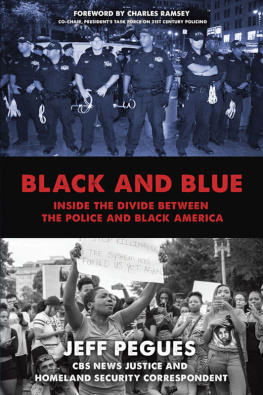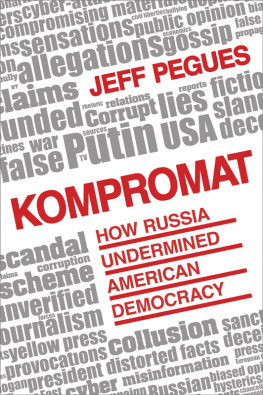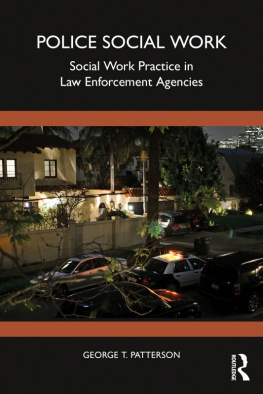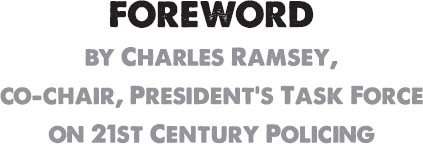Published 2017 by Prometheus Books
Black and Blue: Inside the Divide between the Police and Black America. Copyright 2017 by Jeff Pegues. All rights reserved. No part of this publication may be reproduced, stored in a retrieval system, or transmitted in any form or by any means, digital, electronic, mechanical, photocopying, recording, or otherwise, or conveyed via the Internet or a website without prior written permission of the publisher, except in the case of brief quotations embodied in critical articles and reviews.
Trademarked names appear throughout this book. Prometheus Books recognizes all registered trademarks, trademarks, and service marks mentioned in the text.
Cover design by Jacqueline Nasso Cooke
Cover images M. Stan Reaves / Alamy (top);
Rena Schild / Shutterstock (bottom)
Cover design Prometheus Books
Inquiries should be addressed to
Prometheus Books
59 John Glenn Drive
Amherst, New York 14228
VOICE: 7166910133
FAX: 7166910137
WWW.PROMETHEUSBOOKS.COM
21 20 19 18 17 5 4 3 2 1
Library of Congress Cataloging-in-Publication Data
Names: Pegues, Jeff, 1970- author.
Title: Black and blue : inside the divide between the police and Black America / Jeff Pegues.
Description: Amherst : Prometheus Books, 2017. | Includes index.
Identifiers: LCCN 2016055261 (print) | LCCN 2016059873 (ebook) | ISBN 9781633882577 (hardback) | ISBN 9781633882584 (ebook)
Subjects: LCSH: PoliceUnited States. | Law enforcementMoral and ethical aspectsUnited States. | Police brutalityUnited States. | Police misconductUnited States. | African AmericansCivil rights. | Police-community relationsUnited States. | BISAC: POLITICAL SCIENCE / Political Freedom & Security / Law Enforcement. | SOCIAL SCIENCE / Criminology.
Classification: LCC HV8141 .P34 2017 (print) | LCC HV8141 (ebook) | DDC 363.2089/96073dc23
LC record available at https://lccn.loc.gov/2016055261
Printed in the United States of America

I have been a member of the law enforcement community for forty-seven years. I began my career in my hometown of Chicago, Illinois. I have also served as chief of the Metropolitan Police Department in Washington, DC, and police commissioner in Philadelphia. I have witnessed a change in policing over the years, but nothing compares to the challenges we face today.
I first met Jeff Pegues while I served as police commissioner in Philadelphia. He had occasion to visit me in my office to interview me for the CBS Evening News about officer-involved shootings in the wake of the killing of Michael Brown in Ferguson, Missouri, and other highly charged incidents, some of which were captured on video. Black and Blue highlights many of the cases that have sparked controversy, tension, and protests in cities across America, as well as a growing rift between police and communities of color.
High-profile incidents, in particular, those involving questionable uses of force, have caused police leaders to find new ways to reach out to the community and repair the damage. Rising crime rates in some cities lead some to believe in the so-called Ferguson effect, meaning police officers are apprehensive when working in what they perceive as an anti-police environment and are therefore reluctant to be proactive when dealing with crime in the neighborhoods they patrol. And, as Pegues's book points out, some members of the community fear the police who are there to protect them.
Trust between police and the communities they serve is essential in a democracy. To establish trust, we must all first face hard truths, as FBI director James Comey indicated. Police officers and their supporters cannot pretend as if excessive force and unequal enforcement of laws do not exist in some cases. To say that is not an indictment of the entire policing profession, however. The majority of the men and women who serve in law enforcement do so with great honor and dignity. They are compassionate and caring people who do their best to bring a sense of safety and justice to the communities they serve. But we cannot ignore the fact that biased policing and even racism exists among a few in our ranks. Those individuals must be rooted out.
The history of policing in America shows us that law enforcement has not always performed its duties in a fair and impartial manner. Officers who abuse their authority or treat the public disrespectfully must be held accountable. Terry Cunningham, a past president of the International Association of Chiefs of Police, took the bold move at a recent gathering of hundreds of police chiefs, to apologize to communities of color for past injustices at the hands of police. At the same time, the community must recognize that not every officer-involved shooting or use of force is improper or the result of biased policing. The violence that plagues many of our communities will end only if police and the community work together to establish mutual trust and respect.
Jeff Pegues provides thoughtful insight into the challenges facing police as they attempt to build relationships and legitimacy in communities of color. He accurately captures the complexity of addressing the issue of race and policing in America by forcing us to look at ourselves and find ways to overcome the fear and distrust that exists on both sides. This book is a must-read for police and community members alike.
We don't always listen. Everyone is so busy trying to be heard that people aren't listening to each other. As a consequence, people often don't know what's really going on in the country, in their neighborhoods, or even in their homes.
I was sitting in a Philadelphia restaurant one night after my live shot for the CBS Evening News. It had been a long day and I was hoping to just unwind. I was led to a seat at a table in the bar area, and on the televisions in front of me I could see cable news. At the time, the nation was exactly two weeks away from electing Donald Trump as president of the United States. Trump and Hillary Clinton had slogged through one of the most divisive presidential campaigns in US history. So many wounds had been opened. So much pain had been exposed for so many people. Regardless of whether they disliked Clinton or Trump, there was a lot of bad blood spread across so many people. Thankfully, the volume on the televisions in the bar was down. Frankly, I didn't want to hear the talking heads anymoreprognosticating about what was coming next or who was up or down. Like the rest of America, I had heard enough! I was content to zone out at the table with the televisions in front of me, while at the same time trying to think of a way to finish writing this book.
It's not that I was feeling the pressure of getting everything done by the deadline, rather, I wanted to make sure that I covered all of the important topics. The deadline for the manuscript was now just days away, and the months of juggling my day job and the weekend work of writing was taking its toll. This was also a busy time on the Justice and Homeland Security beat. US intelligence sources had confirmed that they believed the Russians were trying to influence the election, and the prospect of a US cyberattack response was on the horizon. But looming right over my shoulder was writer's block.











